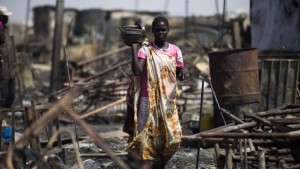Violations of South Sudan’s ceasefire continue to take place with both sides responsible for outbreaks of fighting, according to the latest reports from the African Union-backed monitoring team. The conflict is spreading from northeastern South Sudan to other areas of the country, said a spokesperson for the Ceasefire and Transitional Security Arrangements Monitoring Mechanism (CTSAMM).
“Violations continue to occur and both parties are implicated,” Ruth Feeney, a spokesperson for the CTSAMM told RFI on Monday. “There is still a lot of work to do in terms of ensuring that the permanent ceasefire takes hold,” she added.
The reports cover a period from the end of December until March and are produced by the Joint Monitoring and Evaluation Commission (JMEC), which was put in place to monitor possible violations by government forces and rebel groups following the signing of the peace deal seven months ago.
“What we’re seeing to date is that both parties are not respecting the permanent ceasefire,” said Feeney from CTSAMM, which reports to the JMEC and operates under the auspices of the Intergovernmental Authority on Development regional bloc.
The reports specifically cover allegations of ceasefire violations in Upper Nile, Western Equatoria and Western Bahr el Ghazal states. However, the monitoring team has also noted a “shift in the conflict”, said Feeney.
“The rest of the country seems now to be getting drawn in whereas before the hostilities were very much focused in the Greater Upper Nile area,” she said.
South Sudan’s civil war broke out in December 2013 when President Salva Kiir accused his former deputy Riek Machar of plotting a coup.
Fighting between Machar’s Sudan People’s Liberation Movement-in Opposition (SPLM-IO) group and government forces could have left some 300,000 dead, according to a recent report by the AFP news agency about the death toll from the civil war.
The two rivals signed a peace deal in August last year, committing to bringing an end to the conflict. But fighting has continued with the government and rebels both accusing one another of breaking the ceasefire.
“We want to go into areas where the peace is being jeopardised and make sure that the truth of what is going on in those areas is being discussed by both parties,” said Feeney, saying that the monitoring team is using “empirical” and “thorough” investigative techniques to probe allegations of violations.
“The patience of the international community – as is my own – is being tested,” said Festus Mogae, former Botswana president and head of the JMEC, in comments last week about reports of ceasefire violations.
The two sides had also agreed to form a transitional government, although it has been dogged by delays with key deadlines having been missed.
Violations reported by the JMEC:
- Ambush north west of Malakal, Upper Nile State on 8 February carried out by SPLM-IO.
- Offensive operations in Mundri, Western Equatoria State on 10 and 11 February by government forces.
- Attack in Lui, Western Equatoria State on 24 December carried out by SPLM-IO.
- Shelling in Upper Nile State on 28 January by forces allied to SPLM-IO.
- Offensive operations and failure to protect civilians in Wau, Western Bahr el Ghazal State by government forces at end of December 2015.
rfi.fr



